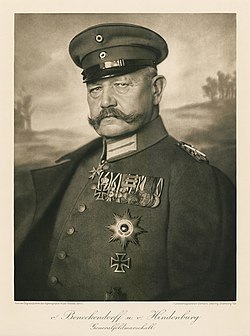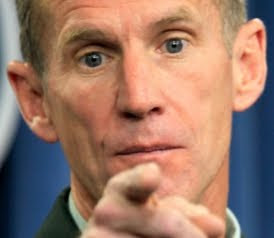Paul von Hindenburg President of Germany and Legacy 12 May 1925 – 2 August 1934

Paul Ludwig Hans Anton von Beneckendorff und von Hindenburg ( listen (help·info)), known universally as Paul von Hindenburg (German: [ˈpaʊl fɔn ˈhɪndn̩bʊɐ̯k] (
listen (help·info)), known universally as Paul von Hindenburg (German: [ˈpaʊl fɔn ˈhɪndn̩bʊɐ̯k] ( listen); 2 October 1847 – 2 August 1934) was a German military officer, statesman, and politician who served as the second President of Germany from 1925-34.
listen); 2 October 1847 – 2 August 1934) was a German military officer, statesman, and politician who served as the second President of Germany from 1925-34.
Hindenburg retired from the army for the first time in 1911, but was recalled shortly after the outbreak of World War I in 1914. He first came to national attention at the age of 66 as the victor of the decisive Battle of Tannenberg in August 1914. As Germany's Chief of the General Staff from August 1916, Hindenburg's reputation rose greatly in German public esteem. He and his deputy Erich Ludendorff would then lead Germany in a de facto military dictatorship throughout the remainder of the war, marginalizing German Emperor Wilhelm II as well as the German Reichstag.
In line with Lebensraum ideology, he advocated sweeping annexations of territory in Poland, Ukraine and Russia in order to re-settle Germans there.
Hindenburg retired again in 1919, but returned to public life in 1925 to be elected the second President of Germany. In 1932, although 84 years old and in poor health, Hindenburg was persuaded to run for re-election as German President, as he was considered the only candidate who could defeat Adolf Hitler. Hindenburg was re-elected in arunoff. He was opposed to Hitler and was a major player in the increasing political instability in the Weimar Republic that ended with Hitler's rise to power. He dissolved the Reichstag (parliament) twice in 1932 and finally, under pressure, agreed to appoint Hitler Chancellor of Germany in January 1933.
In February, he signed off on the Reichstag Fire Decree, which suspended various civil liberties, and in March he signed the Enabling Act of 1933, which gave Hitler's regime arbitrary powers. Hindenburg died the following year, after which Hitler declared the office of President vacant and made himself head of state.
Commentary
The seed of Hitlers aim for greater German expansion Lebensraum ideology existed before Hitler became Chancellor in Germany by persons such as Paul Von Hindenburg

Comments
Post a Comment